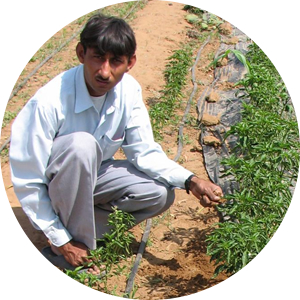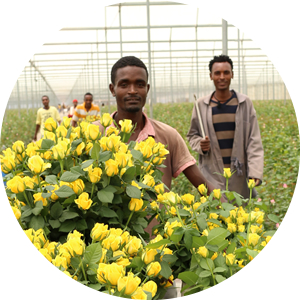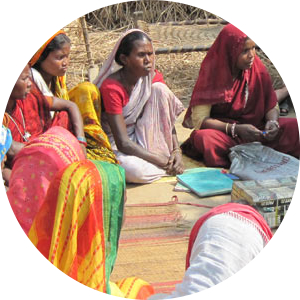Partner with us
Collaboration is at the heart of everything we do.
IWMI partners with numerous organizations both to deliver its world-class research and to develop practical solutions to water management challenges.
Key partners include:
- Private sector
- Universities and research institutes
- International organizations and conventions
- Civil society
- Government ministries and agencies
Partnering for progress
How our work with others delivers dividends
IWMI-Tata Water Policy Research Program
 IWMI-TATA Water Policy Research Program is a collaborative initiative in India between IWMI and the Sir Ratan TATA Trust (SRTT). This partnership emerged from a shared concern regarding the growing water stress in different parts of the sub-continent. The program aims to evolve fresh perspectives and sustainable solutions by drawing from the vast research carried out across the country and take these in the form of policy recommendations to the policy makers at the national, state and local level.
IWMI-TATA Water Policy Research Program is a collaborative initiative in India between IWMI and the Sir Ratan TATA Trust (SRTT). This partnership emerged from a shared concern regarding the growing water stress in different parts of the sub-continent. The program aims to evolve fresh perspectives and sustainable solutions by drawing from the vast research carried out across the country and take these in the form of policy recommendations to the policy makers at the national, state and local level.
Successes inspired or influenced by IWMI-TATA research include:
- Introducing a “smart rationing” electrical power scheme to Gujarat to deal with groundwater over-exploitation and promote sustainable agricultural growth
- A pilot scheme to promote solar power as a “cash-crop” for farmers so that over pumping of groundwater by solar pumps is avoided
- Removal of pump licenses in West Bengal which were hindering sustainable exploitation of groundwater by poor farmers
- The Punjab Preservation of Sub-Soil Water Act 2009, which helped achieve water savings of 7% in annual groundwater draft, by mandating farmers to delay paddy transplanting to avoid the extremely high evaporation in early summer
The CGIAR Research Program on Water Land and Ecosystems (WLE)
 Led by IWMI and combining the resources of 11 CGIAR Centers, the Food and Agriculture Organization of the United Nations (FAO) and numerous national, regional and international partners, the program seeks to provide an integrated approach to natural resource management research. WLE promotes a new approach to sustainable intensification in which a healthy functioning ecosystem is seen as a perquisite to agricultural development, resilience of food systems and well-being.
Led by IWMI and combining the resources of 11 CGIAR Centers, the Food and Agriculture Organization of the United Nations (FAO) and numerous national, regional and international partners, the program seeks to provide an integrated approach to natural resource management research. WLE promotes a new approach to sustainable intensification in which a healthy functioning ecosystem is seen as a perquisite to agricultural development, resilience of food systems and well-being.
Successes have included:
- Increasing net income from cassava per hectare by almost 100 percent in by pairing better reservoir management with improved crop varieties in Yali, Vietnam
- Improved community water management in Bangladeshi wetlands doubled small fish populations, providing a steady source of food and income for some of the poorest and most marginalized members of society. From 2012 to 2013, the percentage of household Income from fish sales tripled.
- WLE scientists are working with the World Bank to develop new policies on sanitation and waste re-use for the Government of India
AgWater Solutions
 A partnership of six international organizations, led by IWMI, and dozens of local actors, the project sought to promote smallholder farming as an engine for economic growth, poverty reduction and food security by:
A partnership of six international organizations, led by IWMI, and dozens of local actors, the project sought to promote smallholder farming as an engine for economic growth, poverty reduction and food security by:
- Improving the understanding of agricultural water management (AWM) solutions – especially how farmers can gain access to them and the benefits they provide;
- Showing how they can reach millions of farmers by developing strategies and business models that overcome constraints; and
- Communicating these to governments, donors and the private sector so that they can create or refine their policies, investments and implementation strategies.
Central to the approach and to effective AWM solutions is market access – farmers will only invest in AWM options if they make economic sense.
Successes inspired or influenced by Agwater Solutions research include:
- The Government of Tanzania set aside 360mill TZ shs (approximately US$ 200,000) for the Rehabilitation of Irrigation Schemes in response to the AgWater Solutions findings and the FAO project.
- Research was influential in an ambitious new initiative of the Ethiopian government to boost food production and the incomes of five million farmers. Realizing the potential of household irrigation in Ethiopia, a working strategy document from the Ministry of Agriculture and Ethiopian Agricultural Transformation Agency, outlines specific plans for agricultural development to complement the government’s vision of achieving middle-income status by 2025.
- IWMI researchers influenced the Nigerian government to invest in water-management solutions for dry-season farming and to ‘flood-proof’ areas.
- AWM project work also influenced the structure of the USAID-funded Innovation Lab for Small-scale Irrigation project (2013-2018, USD 12 million)

